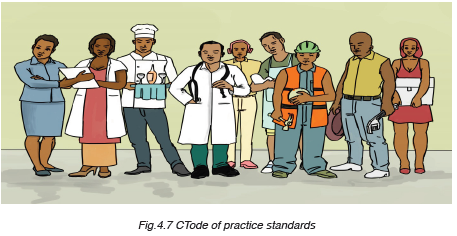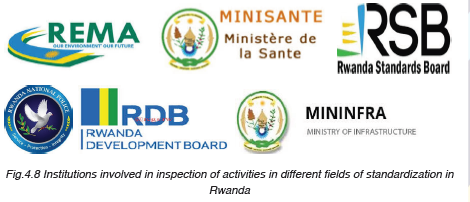UNIT 4: ROLE OF STANDARDS IN BUSINESS

Key unit competence: To be able to justify the need for
standards and its role in business
Introductory Activity
1. Take for example the garments that we wear such as shirts,
shoes, belts even other t h i n g s we use like pocket wallets,
papers, books, pens, padlocks and keys, cups, plates etc. All
these items are of various weights, shapes and they are used
to serve different purposes.
a. In your opinion, why are standards necessary?
b. How are they enforced?
c. What can a consumer do in case he/she has a complaint about
the standard of product or service?
d. What can an e n t r e p r e n e u r do to comply and m i n i m i s e
complaints about his/ her product quality?
4.1. Meaning of standards
Activity 4.1
1. Imagine you have bought cooking oil from a supermarket.
After opening it, you find that it has bad smell is expired,
doesn’t have RSB mark and no longer of use. What can
you do about it? What should you have done before buying
the cooking oil?
2. What laws can be put in place to make sure this kind of thing
does not happen?
A Standard is a set of rules and guidelines or characteristics of activities
or their results established by agreement, documented and approved by a
recognized body aimed at producing a common product.
They are widely accepted, agreed upon or established means of determining
what something should be.
Substandard products/services: These are products/services which
do not m e e t the customers’ needs or purpose of their consumption.
Standardization: This refers to the process of developing and implementing
technical specifications.
Application activity 4.1
1. List the various characteristics of each of the following giving
examples from Rwanda.
a. Standard products/services.b. Substandard products/services.
4.2. Importance of standards
Activity 4.2
Isimbi went to the market and bought a new cloth that she wished to put
on at the party of her brother’s graduation; but when she washed it for
the first time it lost its colour and she really felt betrayed by the seller
because the cloth was no longer good for the party. Mugeni also bought
a pair of open shoes when she was going to visit Mukambwe, not very
far from her home, her new shoes got torn and she had to pay money to
someone to repair her shoes before continuing with the journey.
From the above text;
1. What kind of inconvenience did Isimbi and Mugeni experience?
2. What caused this problem?
3. Identify the dangers that such products can cause to a consumer
?
Importance of standards to the government
• It helps to meet the requirements of the purchasers.
• It strengthens and harmonizes national metrology systems.
(Metrology: scientific process of measurement)
• It develops culture of quality management in public and private
institutions.
• It facilitates the access of Rwandan goods and services to external
markets.
• It leads to better public health, consumer and environmental protection,
economic growth, poverty reduction, better quality of life.
• It protects its citizens from buying poor quality products.
• Standardization is a source of security.
• It promotes good relationship among countries.
Importance of standards to an industry
• It leads to lower costs of production since redundancy and errors have
been minimized.
• It helps industry products, services and personnel to cross borders.
• They improve industry efficiency and remain competitive.
• Helps to earn customers’ loyalty since customers want high quality,
reliable, consistent and safe products and services.
Importance of standards to the consumers
Purchase of good quality products
• They are protected from being over exploited by entrepreneurs
• Improved choice and access to goods and services
• Improved standards of living
• Better products and service information
• Better operational compatibility between products and delivery of
services
Importance of standards to the society
• Protecting natural environment from being contaminated by the
activities of some entrepreneurs.
• Enhanced product quality and reliability at reasonable price
• Improved health, safety, environmental protection and reduction of
wastes in society
• Simplification for improved usability
• Increased distribution efficiency and ease of maintenance
• Standards provide confidence in products and services to the users.
Levels of standardization
• International standardization: Standards developed by international
organizations like International Standards Organization (ISO),
International Electro-Technical Commission (IEC)
• Regional standardization: This enforces standards of services,
goods, infrastructure in a given region like East African Community in
order to promote trade and commerce in accordance with prosperity or
progress of that region.
• National standardization: Standards established by national or state
bodies of a given country. Examples in Rwanda RSB makes sure that all
business activities reflect and comform to standards it has developed.
Examples of standard bodies in Rwanda include; RSB, REMA, RDB,
Rwanda National Police, Ministry of Health, Ministry of Agriculture and
Natural Resources
Types of standards
• Basic standards: These are essential facts or principles that have to
be maintained in a product or in a service provision.
• Product standards: These are established requirements/ qualities/
methods of testing, grading and making a product to ensure that it willserve its purpose effectively.
• Terminology standards: These are words to use in research and
development process. It is for the purpose that the same industry uses
a common, clearly understood language.
• Test and measurement standards: These define the process ofmeasuring the properties of performance of a product.
• Service standards: These are established requirements to be met
in order to achieve designated purpose/service effectively such as forrepairing a car.
• Process standards: Standards that specify the requirements to be
met by a process.
• Code of practice standards: Guidelines given to members to comply
with the association’s ethical practices
• Ethical standards: Moral principles that if respected, promote values
like trust, fairness, kindness, good behavior, etc…
• Performance standards: Standards on how a product is supposed to
function.
• Design standards: These define characteristics or how a product is
to be built.
• Interface standards. This concerns with compatibility.
Institutions involved in inspection of activities in different fields ofstandardization in Rwanda
The Rwanda Standard Board - RSB
The Ministry of Agriculture and Animal resources
The Ministry of Health - MINISANTE
Ministry of Infrastructure - MININFRA
Rwanda National Police – RNP
Rwanda Development Board - RDB
Rwanda Environmental Management Authority – REMA
Application activity 4.2
1. Discuss the various importance of standards to the following
stakeholders in Rwanda in the process of exercising their
rights and obligations.
• Government
• Consumers.
• Industry.
• Society.
2. Discuss the process of standardisation in Rwanda.
Skills lab
1. Referring to the products/services you are making/offering in the business
club or intend to make/offer, compare what would be a standard product
or service or a substandard one. Discuss the advantages of producing
a standard product or service and challenges the club may face if they
fail to meet the standards. Analyse the process the club will go through
to standardise the products and services you offer or plan to, pointing
out the costs, resources, and people/organisations that will be involved.
2. Teacher Gatabazi puts 5-7 different products on a table in front of a
class, i.e. bottle of mineral water, ball, pen, broom, crisps, and sandals
Choose one of the products and imagine you were to explain the
standards used in producing this product to young entrepreneurs.
a. Draw the product on a paper and explain what standards were used in
developing this product. Use arrows to identify what part the standards
apply to consumers.
b. Explain what purpose each standard has for consumers.
End unit 4 assessment
“Ejo Hacu Heza” is a business club in a Teacher Training college. In one
day evening club members in a meeting, decided to start a business
project for their club. The club president Akeza asked the treasurer
Ineza how much they had in their bank account.
The treasurer informed the general assembly that after a period of two
terms they had saved 30,000Frw from 200Frw each member saved
every month.
Rubanguka astonishingly laughed and asked Akeza, “What can we
do with such very little money”? Then, Rangira suggested that they
could be buying avocadoes from the neighboring trading centre and
sell them to their fellow student teachers in the dining as they take
their meals. Munezero, objected Rangira`s view; and emphasised that
they could still come up with a viable business project with the little
savings they had. Ineza asked Munezero how she thinks they can do
with 30,000Frw.
Munezero explained that in their skills lab period, they learnt how to
apply skills acquired from other subjects to make products extension
cables, bar and liquid soaps, juices, body lotion, etc. which are all
made using locally available resources and how to manage business
projects.
To the surprise, Hindigiri asked if the quality of products they would
make would be legally accepted in the market standards; she further
proclaimed that for any product and materials to be accepted for their
purpose use, it must fulfil the required standard. The club members
decided to first consult and research on why their products must be
standardized by a recognized body and why do entrepreneurs go forapproval of their products, materials and services standards.
Questions
1. Why did Hindigiri and “Ejo Hacu Heza” business club worry about the
quality of the products they were making which were not approved
by a recognized body?
2. What do you understand by terms standards, standard goods and
standard services?
3. If after graduating from your college, you and your friend decide
to start a company that produces and sells some of the products
you were making in the skills lab and business club; describe the
standard procedures you will apply to run and make products and
services in your business.4. What is the importance of standards in business and society?
